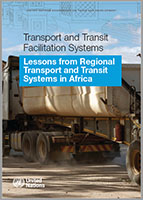
This Study aims to conduct a preliminary investigation of the issues and bottlenecks affecting the implementation of the various initiatives on transport and transit systems launched at the continental and regional levels by the African Union (AU) and African regional economic communities (RECs), respectively.
This initial analysis seeks to identify the cause of the persistently low implementation of multilateral and regional protocols or conventions designed to facilitate transit and transport across the African regions.
Over the last thirty years or so, spurred on by the creation of the World Trade Organisation in 1995, countries have made significant progress in unilaterally lowering trade tariffs and dismantling quota systems. Many would argue that this has resulted in the significant increase in volumes and values of international trade and the growth in global supply and value chains.
The requirements of these global supply and value chains have changed the way logistics and transport services operate, with the demand for just-in-time and just-in-sequence logistics services. This, in turn, has increased the demand for predictable, reliable, and efficient cross-border systems, which include the requirement for efficient, fast, and reliable border clearance procedures, whether from customs, immigration, security, police, agricultural or veterinary departments or other border agencies.
In the globalized world of international trade, it is also clear that the supply chain is as good as its weakest link. A holistic approach to improving supply chain management is required — it is not enough to have an efficient customs service if all other border agencies are inefficient and delay cargo from crossing the border for hours, days or weeks.
For all of the above reasons and more, and as noted by the United Nations Economic Commission for Europe’s Trade Facilitation Implementation Guide, trade facilitation has emerged as a critical factor for international trade efficiency and the economic development of countries. This is because of its impact on competitiveness and market integration and its increasing importance in attracting direct foreign investments.




